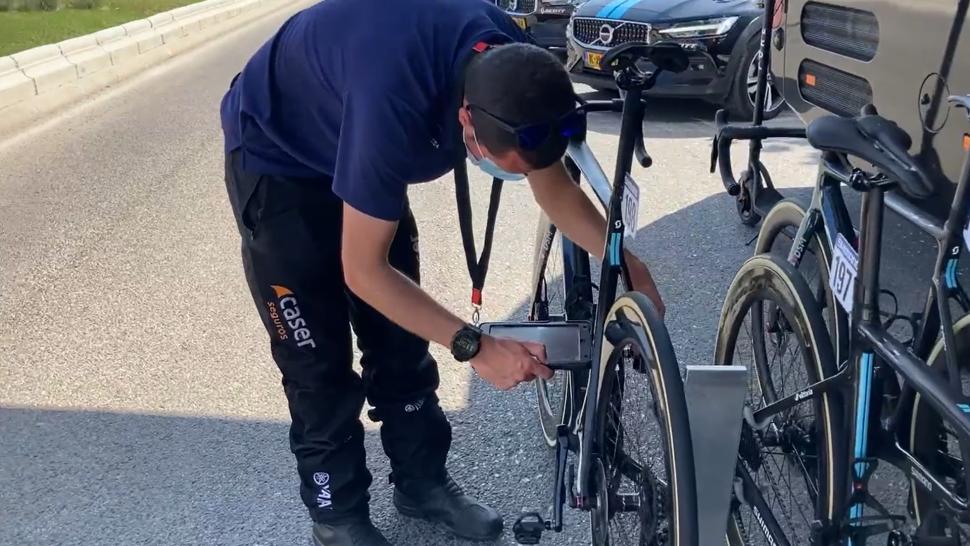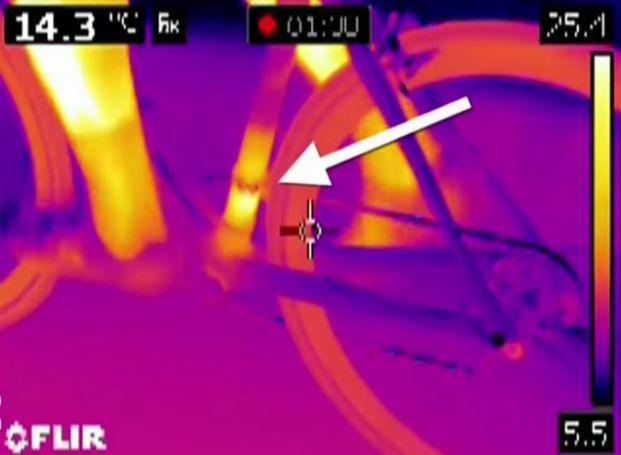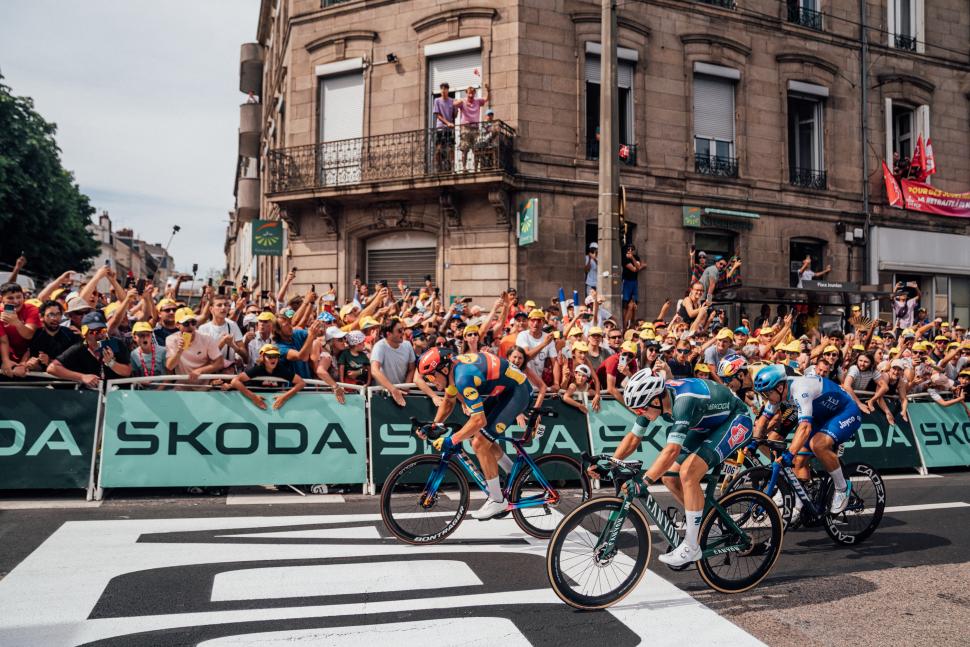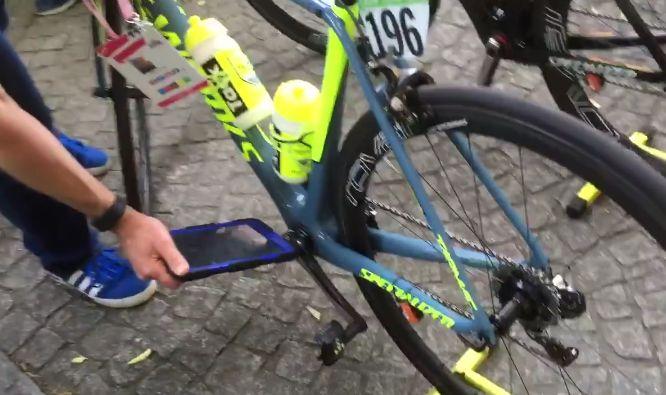- News
- Reviews
- Bikes
- Components
- Bar tape & grips
- Bottom brackets
- Brake & gear cables
- Brake & STI levers
- Brake pads & spares
- Brakes
- Cassettes & freewheels
- Chains
- Chainsets & chainrings
- Derailleurs - front
- Derailleurs - rear
- Forks
- Gear levers & shifters
- Groupsets
- Handlebars & extensions
- Headsets
- Hubs
- Inner tubes
- Pedals
- Quick releases & skewers
- Saddles
- Seatposts
- Stems
- Wheels
- Tyres
- Tubeless valves
- Accessories
- Accessories - misc
- Computer mounts
- Bags
- Bar ends
- Bike bags & cases
- Bottle cages
- Bottles
- Cameras
- Car racks
- Child seats
- Computers
- Glasses
- GPS units
- Helmets
- Lights - front
- Lights - rear
- Lights - sets
- Locks
- Mirrors
- Mudguards
- Racks
- Pumps & CO2 inflators
- Puncture kits
- Reflectives
- Smart watches
- Stands and racks
- Trailers
- Clothing
- Health, fitness and nutrition
- Tools and workshop
- Miscellaneous
- Buyers Guides
- Features
- Forum
- Recommends
- Podcast
news
 Vuelta motor doping check (@lavuelta/Twitter)
Vuelta motor doping check (@lavuelta/Twitter)“It will destroy our sport”: UCI set to pay whistleblowers for “credible” motor doping information ahead of Tour de France
UCI president David Lappartient has revealed that world cycling’s governing body is planning to pay whistleblowers and informants who come forward with “credible” information related to the suspected use of hidden motors in the peloton, days after the UCI announced that it will pilot the use of a new unspecified “inspection tool” designed to uncover mechanical fraud at the Tour de France.
In an interview with the Ghost in the Machine podcast, Lappartient said that financial incentives for motor doping whistleblowers would prove the UCI is taking the issue – which he claims has the potential to “destroy cycling” – seriously.
Lappartient also raised concerns about the methods currently in place to detect the presence of hidden motors within bikes, such as handheld tablets, and the increasingly frequent use of tactical bike swaps during races, while insisting that the UCI is “not afraid” to catch even the sport’s biggest names if they’re found to be using a motor.
Meanwhile, the newly installed head of the UCI’s fight against motor doping, former US Homeland Security investigator Nick Raudenski, told the podcast that the governing body is increasing its efforts to detect motor doping thanks to the constant rumours, allegations, and questions about “superhuman performances” that have permeated the sport in recent years.
While Belgian cyclocross rider Femke Van den Driessche remains the only elite level professional to have been banned for mechanical doping, after a concealed motor was found in her bike at the 2016 world championships in Zolder, accusations and innuendo concerning the use of hidden motors in the highest echelons of the sport continue to swirl around the peloton.
Last September, in the wake of Jumbo-Visma’s 1-2-3 atop the Col du Tourmalet at the Vuelta a España, a feat they repeated on the grand tour’s final podium as Sepp Kuss took the top spot ahead of Jonas Vingegaard and Primož Roglič, former Quick-Step pro Jérôme Pineau accused the Dutch team, without providing any evidence, of mechanical doping, while claiming that the UCI “don’t control anything anymore and do what the big teams want”.
And just last month, a former actor whose restaurant chain, Italian Trattoria, sponsors Mark Cavendish’s Astana Qazaqstan team, hastily fled from an amateur race in France – with the bizarre scene featuring the driver of a team van reportedly hitting the race organiser and continuing to drive with him clinging to the bonnet – after allegations of motor doping were levelled against him, which he has strenuously denied.
Earlier this week, the UCI warned any rider attempting to race the Tour de France, which starts tomorrow in Florence, with a hidden motor that it is “impossible to slip through the net”, and that a new, currently unspecified “inspection tool” that takes advantage of the “latest technology” will be used at the French grand tour for the first time.
The governing body added that before each of the 21 stages of the Tour, checks will be carried out using a magnetic tablet on every bike being used at the start of that day’s stage, in a bid to detect any hint of a concealed motor.
After each stage, bikes belonging to that day’s winners, riders wearing the Tour’s classification jerseys, several “randomly selected” riders, and any rider “who gives rise to suspicion” either before or during the stage, will be tagged immediately and checked using portable non-intrusive X-ray inspection technology. If necessary, the commissaires will then be permitted to dismantle the bike.
(Zac Williams/SWpix.com)
And now, cycling’s chief administrator has added another layer to the UCI’s plans to combat suspicions of motor doping: the potential for financial reward for any whistleblower.
“We will pay if it’s a case. This is a way to show that we really take this seriously,” David Lappartient told the Ghost in the Machine podcast, which explores the history of mechanical fraud in the sport.
Lappartient added that the UCI will “pay for “qualified information” and that “we are not afraid to have this information and to then verify it ourselves”.
“We need to be sure that nobody will come to us with wrong information for money, so we will check and pay [if the information is credible]. This is a way to show that we really take this seriously,” the Frenchman sad.
“The worst thing for the UCI would be if we are informed of a case of technological fraud and we do nothing. Then it will not only destroy cycling, but the institution itself.
“We can’t be an institution that says, ‘OK, this doesn’t exist and we won’t spend a lot of energy on this.’ I believe that with new technologies, with engines becoming smaller and smaller, maybe less easy to detect, we have to invest more in the technology, and also on investigation.”
(Pauline Ballet/SWpix.com)
Lappartient also raised concerns about the overuse of the handheld tablet method for tests, in place of more advanced tools such as backscatter tests or x-ray machines. The use of a tablet fitted with a dongle which detects magnetic fields has long been criticised by pundits due to its lack of accuracy and inability to see through carbon frames, despite accounting for 88 per cent of all tests carried out throughout 2023.
“It’s better than nothing, but it’s not consistent enough, and that’s clearly not enough,” Lappartient said about the current reliance on the tablets. “I do believe that the tablets are maybe not necessary and you can cheat even with a tablet. I don’t trust that the tablets are strong enough to fight against technological fraud.”
The UCI president also pointed to the current trend of frequent tactical bike swaps during races – such as before crucial moments and key climbs – which he says make it difficult for commissaires to track down the bike that was actually used by the rider during the stage.
At last year’s Giro d’Italia, for example, 158 bikes were tested before stage 20, the decisive mountain time trial to Monte Lussari. However, almost all of the riders taking part changed their bike before the steep final climb, with no tests carried out on those climbing bikes after the stage.
“I want to be sure the bike that will be tested at the end [of the stage] is the bike that has been used,” Lappartient said.
“It seems to me that the process is not 100 per cent secure. Sometimes you don’t know why they change their bike at 10km to go. I want them to be 100 per cent sure that we will catch them. We are not afraid to catch somebody.”
He continued: “We regained credibility after 20 years of Armstrong. It took us a long time. Tomorrow, if we have a case of cheating with a motor in the bike – sorry, but it will destroy our sport.”
Meanwhile, former criminal investigator Nick Raudenski, the surprise replacement for former world time trial champion Mick Rogers as the UCI’s lead in the fight against motor doping last month, has promised to investigate allegations of historic motor doping in the peloton, along with trying to keep the governing body up to speed with cycling’s latest game of cat and mouse between the authorities and the cheaters.
“They’re not going to do the same thing they did 10 years ago, the same motor Femke used, for example,” Raudenski told the podcast.
“They’re going to advance and continue to develop, so if we say that ‘we’re on to this or we’re only looking for this area,’ you’re playing into their hands.
“I think the technology is out there. I think it exists and I think if there is enough money to throw at a problem or a situation, then there is enough money to provide a solution that will likely not be so easy to detect.
“The UCI is taking it seriously – it’s why we’re investigating, developing, and advancing it from where we’ve come from in the past because the rumours aren’t going away, the allegations are there, there are questions about superhuman performances, and so we have to be awake and be able to answer those, and at least be satisfied that we have done everything we can to try and least assess the situation.
“It’s the age-old cat and mouse game that we always had, whether it’s doping, crime, or finding technological fraud. We’re always going to be looking for those changes and how they’re trying to cheat and beat the system.”
After obtaining a PhD, lecturing, and hosting a history podcast at Queen’s University Belfast, Ryan joined road.cc in December 2021 and since then has kept the site’s readers and listeners informed and enthralled (well at least occasionally) on news, the live blog, and the road.cc Podcast. After boarding a wrong bus at the world championships and ruining a good pair of jeans at the cyclocross, he now serves as road.cc’s senior news writer. Before his foray into cycling journalism, he wallowed in the equally pitiless world of academia, where he wrote a book about Victorian politics and droned on about cycling and bikes to classes of bored students (while taking every chance he could get to talk about cycling in print or on the radio). He can be found riding his bike very slowly around the narrow, scenic country lanes of Co. Down.
Latest Comments
- David9694 41 min 51 sec ago
Down my way, a 200 yard bus gate or 20 mph limit extinguishes all economic and domestic life, so I assume Paris centre-ville has been rendered a...
- Miller 1 hour 31 min ago
Thanks. I have no idea about the bike which is being held at a local police station. I can't imagine it's in good shape. I remember nothing about...
- TimC340 1 hour 44 min ago
Why didn't RoadCC have a review sample before this article? Then it would be less speculation and more fact. Never mind, DCRainmaker and DesFit...
- mark1a 5 hours 35 min ago
I think the best thing I did when I rode the sportive in 2016 (163km edition from Busigny with all 29 cobbled secteurs) was to fit Elite Pria Pavé...
- mark1a 5 hours 55 min ago
On the plus side, I haven't taken out any over 50 life insurance plans or felt compelled to arrange any prepaid funerals over the weekend, or...
- chrisonabike 7 hours 44 min ago
Edinburgh has formal booking, they added putting "bike" or "cargo bike" in the car registration section. (I've just checked again and oddly you...
- ktache 8 hours 5 min ago
I don't think I will be converting anytime soon, but thanks for the report, and I wouldn't mind if you update with real world use.
- Freddy56 8 hours 50 min ago
I would say it more a jersey than a jacket. Super warm chest insulated with the sleeves are lighter, more like a roubaix top, so, ideal spring wear...
- PenLaw 9 hours 8 min ago
Nigel Farage is simply pleasing his main sponsors, that being big oil and their Telegraph/Express pseudo employees....
- Rendel Harris 10 hours 26 sec ago
I don't know if they would specifically target them but I do know that travelling on local services around London a couple of times a week, once or...




Add new comment
3 comments
"The UCI president also pointed to the current trend of frequent tactical bike swaps during races"
Ban bike swaps. The bike you start the race/tour on is the one you finish on. Problem solved. Most bike manufacturers are giving up on separate climbing/aero bikes now anyway. Time trialling is a whole different discipline from road-racing, we don't do CX or MTB stages in tours so why have a time trial?
Imagine a big name being outed like Pogacar or Jonas V, Remco E..what would actually happen - he'd be, ostracized and everyone else would breath a sigh of relief..it wasn't them 🤔
"Impossible to ride the TdF with a motor this year"
"Oh btw I had covid last week"
Makes you think eh.
(I'm 99% joking)